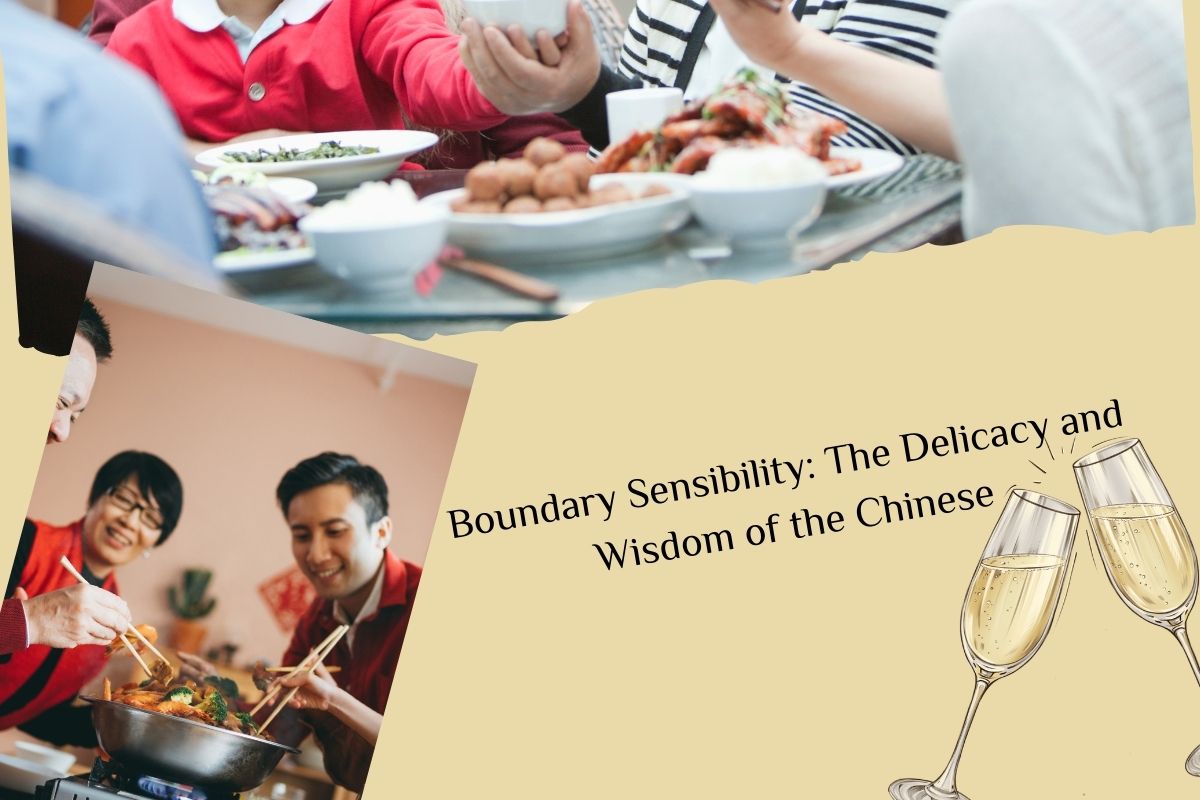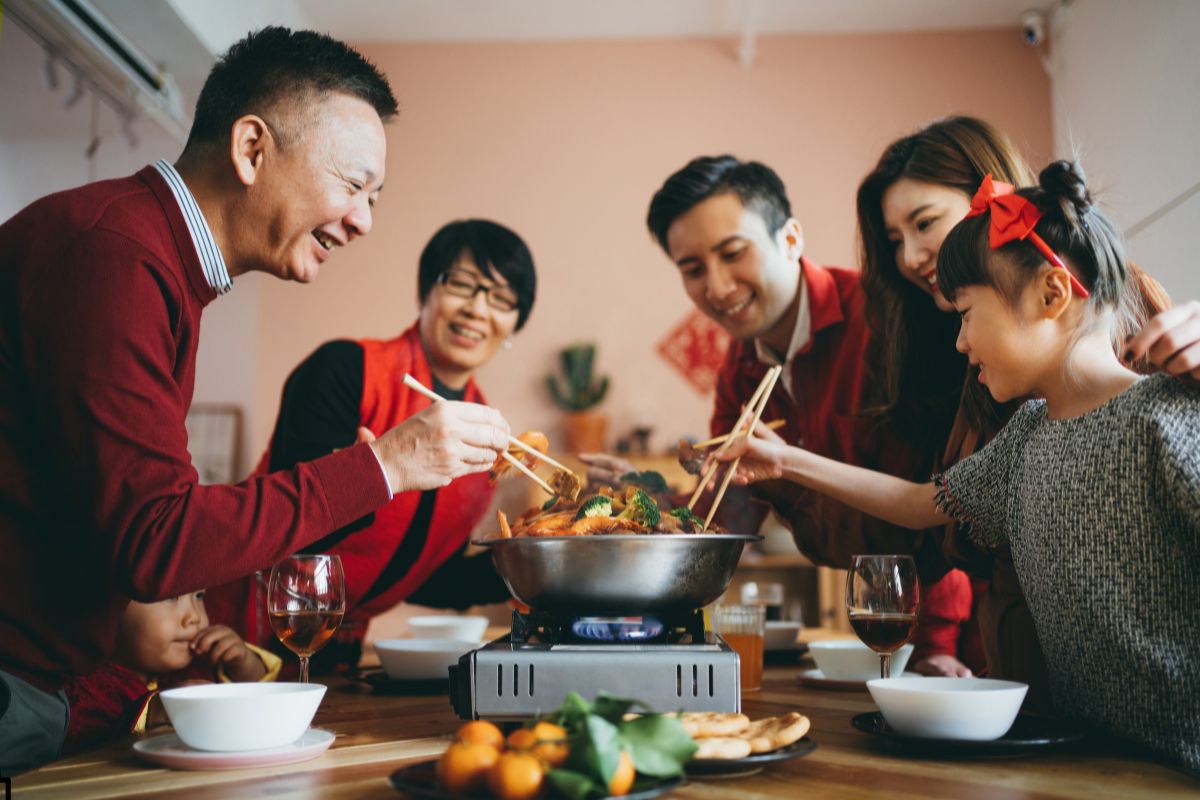Boundary Sensibility: The Delicacy and Wisdom of the Chinese
Perhaps you have heard that the Chinese are humble or reserved, but do you understand the profound wisdom behind this? In reality, it stems from a strong sense of boundaries, which permeates all aspects of daily life, particularly manifesting in dining etiquette and social interactions, showcasing the sense of propriety when interacting with others and the respect for others. This article will elaborate on the intricate and profound Eastern wisdom of this sensibility!

Boundary Sensibility at the Dining Table
Different from Western dining etiquette 礼仪(lǐ yí), the Chinese emphasize "courtesy" and "sharing" at the table, yet they also pay significant attention to personal space and boundaries.
礼仪 (lǐ yí), noun, etiquette
Examples:
- China is a nation of etiquette.
中国是礼仪之邦。
zhōnɡ ɡuó shì lǐ yí zhī bānɡ 。 - Table etiquettes are very important.
餐桌礼仪是很重要的。
cān zhuō lǐ yí shì hěn zhònɡ yào de 。
In formal dining settings, the seating arrangement is meticulously considered, a behavior that conveys respect for elders and leaders. Typically, older individuals or those with higher positions are seated in prominent central locations, while younger or lower-ranking friends are positioned slightly farther from the center. Such an arrangement not only upholds traditional etiquette but also discreetly maintains that sense of boundaries in everyone's hearts.

During meals, despite a table filled with various delicacies shared by all, you will notice that each person has their dedicated bowl and chopsticks, allowing individuals to select food from the communal dishes. This practice preserves the warmth of communal dining while also attentively catering to everyone's hygiene habits. These small gestures embody a profound respect for each other's boundaries.
Furthermore, everyone is cautious when picking up food, avoiding excessively stirring their chopsticks in the dishes, which prevents discomfort for tablemates and once again illustrates the Chinese people's keen sense of boundaries.
Social Etiquette
Greetings问候(wèn hòu) and Salutations

问候 (wèn hòu), noun, greeting
Examples:
- They exchanged greetings.
他们相互问候。
tā men xiānɡ hù wèn hòu 。 - She waved a friendly greeting.
她友好地挥手问候。
tā yóu hǎo dì huī shǒu wèn hòu 。
When Chinese people meet, they typically smile and say "hello" as a basic greeting. In the morning, you might hear "good morning," and in the evening, "good evening." With more familiar friends or elders, greetings may include their titles, such as "Aunt Zhang, good day" or "Teacher Li, good morning." In informal settings, young individuals might use more affectionate terms like "hey" or directly addressing one's name. It is important to adjust the manner and depth of greetings based on the person's identity and relationship to avoid being overly familiar or too distant.
Offering Seats
In public transportation, offering seats to the elderly, pregnant women, parents with young children, or individuals with mobility challenges is an etiquette highly valued in Chinese culture. This behavior demonstrates care and respect for the vulnerable. When offering a seat, individuals typically softly say, "please have a seat" and may gesture towards the seat. It is essential to offer a seat humbly, avoiding making the other person feel like a charity case, while also ensuring not to make the recipient feel awkward or uncomfortable.
Toasting

In Chinese dining culture, toasting is a significant way to show respect and enhance relationships. When offering a toast, it is customary to raise the glass with both hands slightly lower than the other person's, indicating respect. When toasting to elders or superiors, one should stand, offer blessings such as "wishing you good health and success," and then gently clink glasses. While toasting is customary, moderation is crucial to avoid forcing others to drink, demonstrating respect for others' choices and concern for health.
Reciprocity in Gift-Giving: The Exchange of Gifts

In Chinese culture, giving gifts is seen as a way to deepen friendships, express gratitude, and show respect. If receiving a gift from someone, it is customary to reciprocate at an appropriate time, reflecting mutual care and equality. However, the value of the return gift does not have to be extravagant; the focus lies in the sincerity of the gesture.
In these behaviors, the Chinese exhibit a sense of boundaries that embodies both intimacy and respect, maintaining an appropriate distance of politeness to avoid making others uncomfortable or stressed. These subtle nuances reflect the beauty of human care and etiquette in Chinese culture. This boundary sensibility, as a wisdom of interpersonal communication, acts as a bridge connecting the distance of the soul, infusing each interaction with warmth and reverence.